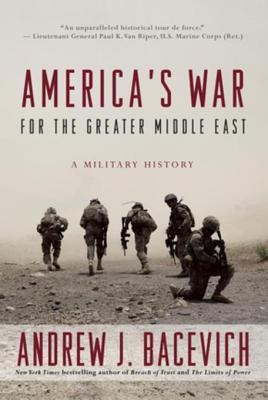
America's War for the Greater Middle East
A Military History
کتاب های مرتبط
- اطلاعات
- نقد و بررسی
- دیدگاه کاربران
نقد و بررسی

Starred review from April 4, 2016
Bacevich (Breach of Trust), a respected historian, international relations specialist, and U.S. Army veteran, unleashes another sharp and informed critique of U.S. foreign policy. He argues that, beginning in 1980, a transformation of priorities occurred in which access to oil in the greater Middle East (a very broad term that encompasses the Middle East, Southwest Asia, parts of Central Asia, North Africa, and the Sahel) arose as a strategic imperative. As the U.S. began to develop an increased proclivity for military force, it became progressively entangled in regional developments, launching operations in Iran, Somalia, Iraq, Afghanistan, Libya, and beyond. Bacevich ties these actions and interventions together in a clear and accessible narrative, positing that such engagements have been rife with ignorance and ambiguity. Moreover, they have largely been ineffective in their purposes and have often resulted in unintended, unforeseen, and destructive consequences that continue to plague the region. The analysis and criticisms are often piercing and rarely elucidated in mainstream echo chambers; the tone is restrained, balanced, and authoritative, rather than radical and incendiary. Politicians and policymakers would be well advised to take into account what Bacevich reveals as the potential long-term consequences of the use of military power. This exemplary work, both readable and deeply informative, will be welcomed by anybody interested in U.S. foreign policy and curious about the present-day afflictions of the greater Middle East. Maps. Agent: John Wright, John W. Wright Literary Agency.

June 3, 1988
The author of Johnny's Song (which earned him the title of National Poet Laureate of the Vietnam Veterans of America) attempts to reconcile his Vietnam experiences with his return to America. These poems are a veteran's raw, heartfelt pleas for lasting peace and for a reevaluation of patriotism, nationalism and a government that wars ``as a solution to economics/or as a perpetuation of social justice.'' Verses shift from jarring, often graphic accounts of the atrocities Mason witnessed to strangely peaceful images of his childhood, family and friends. These juxtapositions would be more effective were they not so explicitly spelled out; Mason explains rather than illustrates, and he frequently lapses into didactic sermonizing. Although his message is certainly worthy, Mason's tendency to rely on political rhetoric rather than craft (in ``A Living Memorial,'' for example, he writes, ``It is the courage of America/ and the strength of our world/ that the essence of our patriotism/ is not nationalism,/ it is humanity'') makes his work more appropriate to forms of expression other than poetry. The introduction by film director Oliver Stone adds nothing of value to this volume.

























دیدگاه کاربران